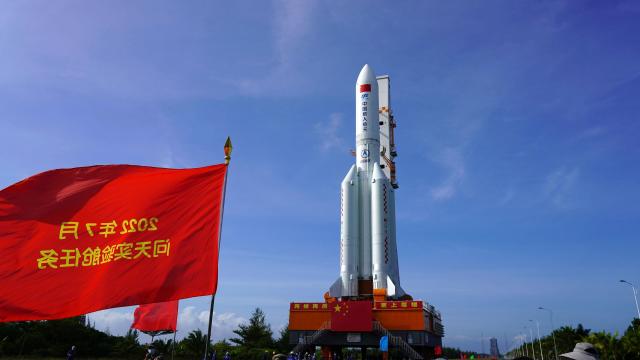Experts are predicting that the gigantic core stage of a recently launched Long March 5B rocket will crash to Earth within a matter of days, but the precise location remains impossible to guess.
The Long March 5B rocket blasted off on July 24 from the Wenchang Space Launch Site in Hainan. The rocket successfully delivered the Wentien lab to low Earth orbit, where it docked with China’s Tiangong space station some 13 hours later.
Like previous launches of Long March 5Bs, however, the core stage — which lacks controlled reentry provisions — entered into an Earth orbit, and a quickly deteriorating one at that. The 25-ton (22.5-metric-ton) core stage, designated CZ-5B, is now poised to make an uncontrolled re-entry.
Experts with The Aerospace Corporation’s Centre for Orbital Reentry and Debris Studies (CORDS) have calculated a likely date for the arrival of this wayward rocket body. They analysed data from the U.S. Space Force’s Space Surveillance Network to devise the estimate, which suggests the rocket will return to Earth on July 31 at 7:52 a.m. UTC (3:52 a.m. ET), with an error bar of plus-minus 22 hours.
Our latest prediction for #CZ5B rocket body reentry is:
🚀 31 Jul 2022 07:52 UTC ± 22 hours
Reentry will be along one of the ground tracks shown here. It is still too early to determine a meaningful debris footprint. Follow this page for updates: https://t.co/SxrMtcJnj0 pic.twitter.com/xsDqC8rOEt— The Aerospace Corporation (@AerospaceCorp) July 26, 2022
“For tracking and predicting reentries, our team uses public data sets that are generated when an object being tracked passes over one of a collection of sensors across the planet,” Marlon Sorge, technical fellow and executive director at The Aerospace Corporation’s CORDS, explained to me in an email.
The Space Surveillance Network tracks objects in space using radar and optical sensors at multiple locations around the planet. These sensors “observe and track objects that are larger than a softball in low Earth orbits and basketball-sized objects or larger in higher geosynchronous orbits,” Sorge said. “The sensors can determine which orbit the objects are in, and that information is used to predict close approaches, reentries, and the probability of a collision.”
The expected geographical range remains excessively high, with the rocket body potentially reentering somewhere between 41 degrees north and 41 degrees south latitude. “It is still too early to determine a meaningful debris footprint,” the company said in a tweet. The Aerospace Corporation will be updating its tracking page as the estimate gets refined over time.
“Due to the uncontrolled nature of its descent, there is a non-zero probability of the surviving debris landing in a populated area — over 88 per cent of the world’s population lives under the reentry’s potential debris footprint,” according to an Aerospace Corporation statement. The company says that objects of this size don’t burn up in the atmosphere and that typically 20% to 40% of the total mass of a large object will reach the ground, depending on the object.
Normally, core stages don’t reach orbit and are instead guided into the ocean or over sparsely populated areas. In the case of SpaceX’s Falcon 9 reusable rocket, the first stages perform controlled vertical landings on the surface or on drone ships.
This will mark the third time that the core stage of a Long March 5B has entered orbit after launch and fallen back to Earth in an uncontrolled manner, so this trait appears to be a feature of the rocket rather than a bug. Two years ago, debris from an out-of-control core stage fell onto an inhabited area along the west coast of Africa, while debris from a Long March 5B launched last year crashed into the Indian Ocean near the Maldives. In both cases no one was hurt, but scientists have recently raised concerns that, with all the rockets being launched these days, someone might eventually get badly injured or even killed.
“Spacefaring nations must minimise the risks to people and property on Earth of re-entries of space objects and maximise transparency regarding those operations,” Bill Nelson, NASA administrator, said in an agency statement in wake of the 2021 incident. “It is clear that China is failing to meet responsible standards regarding their space debris. It is critical that China and all spacefaring nations and commercial entities act responsibly and transparently in space to ensure the safety, stability, security, and long-term sustainability of outer space activities.”
China is planning to launch its Mengtian space station module this October, which means we’ll get to do this all over again in just three month’s time.
